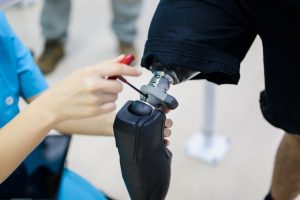If you were injured by either a freezing temperature or prolonged exposure to the cold at work, you might have good grounds to claim compensation. Injuries from cold and wet conditions can cause frostbite and scarring. They could lead to permanent nerve damage and even amputation. These issues can impact your lifestyle and ability to work. Compensation in an accident at work claim could ease the disruption it causes. This guide looks at cold injury claims.
To begin, we look at the eligibility criteria for starting a claim for cold injury compensation. We explore the legal obligation your employer has to ensure your workplace health and safety. Should they fail to meet this obligation and you sustain injuries as a result, you could be entitled to compensation. Then we explain what evidence can help you make a personal injury claim for cold injuries. We also discuss how compensation is worked out and the two main areas in which it is awarded.
The guide finishes by explaining the benefits of instructing a personal injury solicitor on a No Win No Fee basis. This removes the financial obstacles that stop many people from seeking legal representation.
Direct any questions about making a cold injury compensation claim to a member of our advisory team. They can discuss the circumstances that resulted in your injuries and advise on whether you have good grounds to start a claim.
To talk about claiming cold injury compensation:
- Phone on 0208 050 2736 to connect with an advisor.
- Contact us through our website to discuss your claim online
- Use the chat window in the bottom corner.

Select A Section
- When Can You Claim Cold Injury Compensation?
- What Are Potential Examples Of Cold Injury Claims?
- How To Make Cold Injury Claims
- How Much Cold Injury Compensation Could You Receive?
- Why Make A Cold Injury Claim On A No Win No Fee Basis?
- Read More About Accident At Work Claims
When Can You Claim Cold Injury Compensation?
In order to have a valid cold injury claim, you will need to prove that your employer failed to adhere to workplace health and safety laws and this caused your injuries.
All employers are required to take practicable and reasonable steps to prevent their workers from suffering harm as they work as outlined in the Health and Safety at Work etc Act 1974 (HASAWA). This is the duty of care that all employees are owed from their employer. As part of this duty, your employer needs to ensure that reasonable steps are taken to protect employees from both freezing and non freezing cold injuries.
This means that to have good grounds to make a claim for cold injury compensation, you need to prove that:
- Your employer owed you a duty of care at the time of the incident.
- They breached this. For example, by failing to ensure that staff were provided with the required personal protective equipment (PPE) for the cold. This might be gloves, boots and waterproof or thermal attire.
- You sustained cold injuries because of this breach. For example, you suffered a finger amputation due to severe frostbite after working in a freezer without gloves appropriate for extreme cold.
If you have any questions about the eligibility for cold injury claims, please speak to an advisor. They can discuss these criteria with you and assess whether you might have a valid claim.
What Is The Difference Between A Freezing and Non-Freezing Cold Injury?
A non-freezing cold injury (NFCI) is characterised by the slow and gradual cooling of the hands, feet or other areas over a prolonged period of time in the cold or wet. This can cause bodily damage without actually needing to meet a sub-zero temperature.
Freezing cold injuries occur in sub-zero temperatures. They include frostnip (the early stage of frostbite) frostbite and hypothermia. Typically, freezing cold injuries, like frostbite, impact the fingers, toes, ears and nose. Freezing injuries can leave a permanent scar on the skin and cause lasting damage to nerve endings. Freezing cold injuries could result in amputation. However, if hypothermia is left untreated, it can affect the entire body.
Our advisors are on hand to help you understand the basis of a compensation claim for cold injuries.
What Are Potential Examples Of Cold Injury Claims?
Next, we explore a few examples of cold injury that might form the basis of a compensation claim:
- The employer’s failure to provide personal protective equipment (PPE) such as gloves caused a serious hand injury to a worker in the freezer areas of a meat packing plant.
- An employer requested a fisherman to perform an unreasonably long shift outside in cold water temperatures. This cauesd trench foot from standing in cold water.
- As an employee at an indoor ski centre, your employer provided PPE that was insufficient to cope with the freezing temperatures. This resulted in frostbite to your toes and feet.
If you have any questions about cold injury claims, or if you would like to discuss whether you can claim compensation, speak to a member of our advisory team.
How To Make Cold Injury Claims
You will need to collect evidence as part of the personal injury claims process. This needs to prove liability for your cold injuries. To assist you, we have compiled a list of types of evidence that may strengthen cold injury claims:
- Keep a written track of your symptoms and treatments.
- Get the appropriate medical care and request copies of the reports. You can get these from your doctor or GP or any specialists that you consulted.
- Take photos of the visible injuries and of the place where the injury occurred.
- Collect the contact information of anyone who saw what happened so they can give a witness statement later on.
- Request a copy of the accident book.
Please call our dedicated advisors at the contact number above and our team will explain how a solicitor could help you gather evidence.

How Much Cold Injury Compensation Could You Receive?
The compensation awarded in successful cold injury claims can be formed of two types of loss: general and special damages.
General damages is the term used for the physical and psychological injuries sustained in the accident. It also accounts for the long-term damage and impact on your quality of life.
To calculate this head of loss, personal injury solicitors, legal professionals and others with responsibility for doing so may consult with medical records and publications like the Judicial College Guidelines (JCG). This document lists guideline award amounts for a variety of injuries based on the severity and type.
To illustrate, we’ve compiled an excerpt below from the JCG. It looks at injuries that might occur in cold-related instances. Please note, the table is only for guidance. Due to the differences between cold injury claims, it does not represent what you will be awarded if your case is successful. Also, the first line does not come from the JCG:
Compensation Guidelines
| Injury Area | Severity | Guidelines | Definitions |
|---|---|---|---|
| Cases of Multiple Severe Injury and Special Damages Awards | Severe | Up to £500,000 plus | This amount relates to several severe types of injury and special damages for medical fees, care provision and lost wages. |
| Hands | (d) Amputation of Middle, Index and/or Ring Finger | £75,550 to £110,750 | Cases where the hand is left of little use and grip is exceedingly weak. |
| (e) Serious Hand Injuries | £35,390 to £75,550 | Cases where the capacity of the hand is reduced by 50% | |
| (i) Total and Partial Loss of Index Finger | £14,850 to £22,870 | Where the loss causes disfigurement and impaired grip. | |
| (h) Moderate Hand Injury | £6,910 to £16,200 | This reflects instances where medical intervention has failed and a permanent disability remains. | |
| Toes | (a) Amputation of All Toes | £44,570 to £68,430 | Award incorporates whether the loss was traumatic and what impact is left on mobility. |
| (b) Amputation of the Great Toe | In the region of £38,210 | Loss of the Great Toe | |
| (d) Serious Toe Injuries | £11,720 to £16,770 | Damage to several toes that leaves a permanent injury, pain and scarring. | |
| (e) Moderate Toe Injuries | Up to £11,720 | Prolonged minor symptoms that cause discomfort and scarring. | |
| Cold Injuries | (b) With Aggravating Features | in the region of £39,660 | Unmanageable symptoms affect both hands and feet with continuous discomfort and pain in cold conditions. |
You may be able to include special damages in your claim if you can present evidence that shows out-of-pocket losses incurred by your cold injuries. For example, you might have:
- Payslips that show you suffered a loss of earnings because of the injuries.
- Invoices that show how you needed to pay for personal care.
- Proof of medical bills.
- Tickets and receipts for travel expenses to essential appointments.
- Receipts for prescription charges.
Reach out to our advisors on the number above for personalised information on general and special damages.
Why Make A Cold Injury Claim On A No Win No Fee Basis?
It is not a legal requirement to use the services of a personal injury solicitor to start a compensation claim. However, given the excellent benefits of working with one, it makes sense to consider it. For instance, they can:
- Help you compile the supporting evidence needed for your claim.
- Collect supporting witness statements.
- Calculate a compensation amount that covers all the damages and argue for the best level of compensation on your behalf.
- Ensure that your claim is filed within the personal injury claims time limits.
- Support you through the entire process, whether your claim needs to go to court or not.
The solicitors on our panel can offer excellent services like this through a type of No Win No Fee contract called a Conditional Fee Agreement (CFA). A CFA enables eligible claimants to commence a cold injury claim with a solicitor’s support without paying upfront fees for their services.
Furthermore, there are no solicitors fees owed as the claim develops. Additionally, if you are not awarded compensation following an unsuccessful claim, you won’t be asked to pay for their services.
In the event of a successful claim outcome, your solicitor will deduct a small percentage from the compensation that has been awarded to you. This amount is called a success fee and is subject to a legislative cap.
If you would like to see how an arrangement like this could enable you to start a compensation claim after a cold injury, start by speaking to our dedicated advisors. If your case satisfies the eligibility requirements, you could be passed on to a solicitor from our panel.
To talk about cold injury claims:
- Phone on 0208 050 2736
- Contact us through our website to discuss your claim online
- Use the chat window in the bottom corner.

Read More About Accident At Work Claims
Further guides about workplace accidents:
- This guide looks at when a burn injury at work claim is possible.
- Our legal glossary explains the Health and Safety at Work Act 1974 in more detail.
- A general guide to which claims fall under a personal injury category.
Also, here are some external resources that could help:
- A worker’s guide to health and safety from the Health and Safety Executive (HSE).
- Here is a resource on frostbite from the NHS.
- Guidance and information about statutory sick pay (SSP) from the government.
We appreciate you reading our guide on cold injury claims. If you think we can assist in any other way, please connect with advisors using the contact options above.


